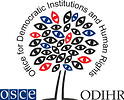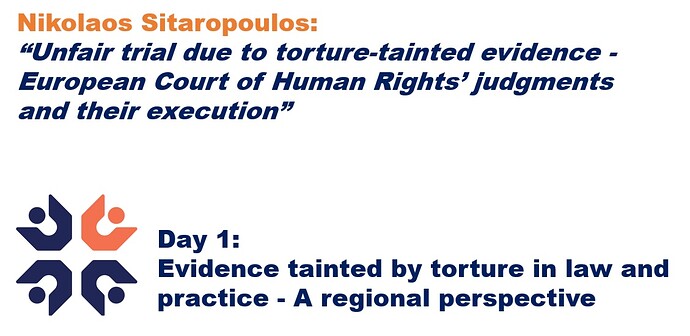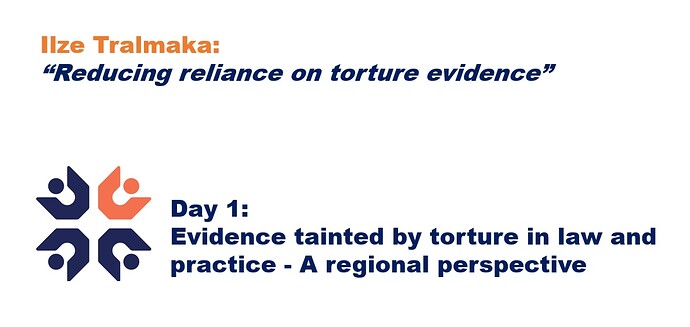Views expressed herein are strictly personal.
Introductory remarks
In its 2018 annual report (§65) the CPT observed that ill-treatment during or in the context of police interviews remains a very serious problem in a significant number of European states. In almost one third of the 47 Council of Europe member states, the CPT has collected evidence of police ill-treatment that may qualify as torture.
The right to a fair trial under Article 6 ECHR, which is not an absolute right, in practice may be linked to Article 3 ECHR (prohibition of torture), which enshrines an absolute freedom. As the ECtHR has stated (Gäfgen v. Germany [GC] 2010, §178), the need to repress and effectively protect individuals from ill-treatment during investigations may require the exclusion from use at trial of real evidence which has been obtained as the result of any violation of Article 3.
1. ECtHR case-law concerning torture-tainted evidence
- Fair trial guarantees start with a criminal charge
The guarantees surrounding the right to a fair trial under Article 6 ECHR apply from the moment that a “criminal charge” exists within the meaning of the ECtHR case-law. Thus they are relevant during pre-trial proceedings. The Court has noted that the investigation stage may be of particular importance for the preparation of the criminal proceedings: the evidence obtained during this stage often determines the framework in which the offence charged will be considered at the trial. An accused may therefore find themselves in a particularly vulnerable position at that stage, the effect of which may be amplified by increasingly complex legislation on criminal procedure, especially evidentiary ones (Ibrahim and Others v. UK [GC], 2016, §253).
- Absolute prohibition of use of confessions made in violation of Article 3 ECHR
As regards the use, as fact-establishing evidence, of confessions (statements) resulting from torture or other ill-treatment in breach of Article 3 ECHR, this practice renders criminal proceedings as a whole unfair. The European Court has underlined that this applies irrespective of the probative value of the statements and irrespective of whether their use was decisive in securing the defendant’s conviction. (Gäfgen v. Germany [GC], 2010, §166, Ibrahim and Others v. UK [GC], 2016, §254).
- Prohibition of use of other incriminating evidence tainted by torture
Under the ECtHR case-law (Jalloh v. Germany [GC], 2006, §105), incriminating evidence – whether in the form of a confession or real evidence – obtained as a result of acts of violence or brutality or other forms of treatment which can be characterised as torture – should never be relied on as proof of the victim’s guilt.
- Incriminating evidence obtained through other forms of ill-treatment
The admission of evidence obtained as a result of an act qualified as inhuman treatment in breach of Article 3, but falling short of torture, may breach Article 6, if it has been shown that the breach of Article 3 had a bearing on the outcome of the proceedings against the defendant, that is, had an impact on their conviction or sentence (El Haski v. Belgium, 2012, §85). The ECtHR has underlined that all the above principles apply not only where the victim of the treatment contrary to Article 3 is the actual defendant but also where third parties are concerned (Othman (Abu Qatada) v. UK, 2012, §263-267, Ćwik v. Poland, 2020, §77 and §89, in the latter case, in particular, ill-treatment was inflicted on a third party by private individuals).
- Ill-treatment and one’s right to silence (privilege against self-incrimination)
The European Court has attached particular importance to one’s right to silence and the privilege against self-incrimination, considering them international standards which lie at the heart of the notion of a fair procedure under Article 6. They do not, however, extend to the use of material obtainable from the accused through the use of compulsory powers but which has an existence independent of the will of the suspect, such as documents acquired pursuant to a warrant, breath, blood, urine, hair or voice samples and bodily tissue for the purpose of DNA testing (Jalloh v. Germany [GC], 2006, §§100-102, Ibrahim and Others v. UK [GC], 2016, §§266-269).
In order to determine whether one’s right to silence has been violated, three major factors have been examined by the European Court: the nature and degree of compulsion used to obtain the evidence; the weight of the public interest in the investigation and punishment of the offence in issue; the existence of any relevant safeguards in the procedure; and the use to which any material so obtained is put (Jalloh v. Germany [GC], 2006, §117)
- Domestic courts’ obligation to examine allegations of ill-treatment casting doubt on the quality of evidence
Under the ECtHR’s case-law, domestic courts should examine the quality of the evidence including whether the circumstances in which it was obtained cast doubt on its reliability or accuracy. Thus, the burden of proof is on the prosecution and any doubt should benefit the accused (Bokhonko v Georgia, 2020 §92). In cases where a defendant makes a prima facie case about the real evidence, forming the basis of conviction, potentially obtained through ill-treatment, national courts are under an obligation to “adequately examine” such an argument and assess the quality of the evidence (ibid. §96, see also Iordan Petrov v. Bulgaria, 2012 §140, where the ECtHR refers to the domestic courts’ obligation to carry out an “analyse approfondie” of the facts of the case if ill-treatment allegations are put forward).
Also, in cases where a defendant submits that the impugned evidence emanates from torture or other forms of ill-treatment on a third person in a third state, the domestic court may not admit this evidence without having first examined the defendant’s arguments concerning it and without being satisfied that no such risk exists (El Haski v. Belgium, 2012, §§88-89).
2. Execution of ECtHR judgments concerning torture-tainted evidence
- States’ obligation to provide redress to victims
All victims of ECHR violations should be entitled, as far as possible, to an effective restitutio in integrum. Under Recommendation No. R (2000) 2 of the Council of Europe Committee of Ministers, states’ legal systems should make it possible to re-examine a case, and reopen proceedings, following a judgment by the ECtHR finding a violation of the ECHR, “especially where: i. the injured party continues to suffer very serious negative consequences because of the outcome of the domestic decision at issue, which are not adequately remedied by the just satisfaction and cannot be rectified except by re-examination or reopening, and ii. the judgment of the Court leads to the conclusion that a. the impugned domestic decision is on the merits contrary to the Convention, or b. the violation found is based on procedural errors or shortcomings of such gravity that a serious doubt is cast on the outcome of the domestic proceedings complained of.”
Thus, in cases where applicants’ convictions are found by the ECtHR to have been tainted by torture or other forms of ill-treatment, the Committee of Ministers, supervising the execution of ECtHR judgments, systematically examines whether applicants had the possibility at national level to request and obtain re-examination and reopening of their cases.
For example, in El Haski v. Belgium, the applicant requested and obtained by decision of the Court of Cassation the quashing of the criminal proceedings at issue and the reopening of the trial in order to rectify the violation committed. In Iordan Petrov v. Bulgaria, in the reopened proceedings, the confessions obtained in breach of Article 3 were excluded from the case-file, the applicant’s conviction was upheld by a final judgment of the Supreme Court of Cassation and the court reduced his sentence from life imprisonment without commutation to life imprisonment. Also in some cases of the Stanimirović group of cases v. Serbia, applicants requested the reopening of the impugned criminal proceedings and in the reopened proceedings the applicants were acquitted of all charges. In the more recent case of Ćwik v. Poland, the Committee of Ministers was informed that reopening of criminal proceedings against the applicant was possible under the Code of Criminal Procedure but no request in this respect has been submitted by the applicant (see also similar situation in Hajrulahu, part of the Kitanovski group of cases v. the former Yugoslav Republic of Macedonia)
- States’ obligation to prevent recurrence of similar ECHR violations
Respondent states are also under an obligation to take general (legislative, regulatory or awareness-raising) measures to prevent similar human rights violations after an ECtHR judgment. Occasionally the ECtHR may identify the problem of ill-treatment during police interrogation as systemic at national level and provide indications/guidance concerning possible general measures to be taken by the respondent state. For example, in Kaverzin v. Ukraine (2012) the Court considered it necessary to stress that Ukraine must urgently put in place specific reforms in its legal system in order to ensure that practices of ill-treatment in custody are eradicated, that effective investigation is conducted in accordance with Article 3 of the Convention in every single case where an arguable complaint of ill-treatment is raised and that any shortcomings in such investigation are effectively remedied at the domestic level (see also Kaverzin group of cases pending before the Committee of Ministers, concerning violations of Article 3).
In certain countries it appears to have been considered sufficient, by the respondent states and the Committee of Ministers, to publicise and widely disseminate the ECtHR judgments to competent national authorities, given that national legislation appeared to be ECHR-compliant while the Article 6 violations seemed to be due to judicial practice (see e.g. Iordan Petrov v. Bulgaria, Gäfgen v. Germany, Jalloh v. Germany (as regards the violation of Article 3 in Jalloh, the practice of administering emetics to obtain evidence was expressly abandoned in the Länder, which had used it - Berlin, Bremen, Hamburg, Hessen and North Rhine-Westphalia), Stanimirović group of cases v. Serbia).
In other countries more measures have been considered necessary. For example, in El Haski v. Belgium the Federal Prosecutor’s Office issued instructions to competent authorities in order to prevent the future use of declarations obtained under torture or through other inhuman or degrading treatment. Moreover, a new law amended the Code of Criminal Procedure explicitly proscribing use of evidence obtained irregularly, thus also indirectly excluding the evidence obtained through torture.
Domestic case-law changes may also be considered able and necessary to prevent similar Convention violations. For example, in the Kitanovski group of cases v. the former Yugoslav Republic of Macedonia, the authorities have informed the Committee of Ministers about a number of Convention-compliant judgments delivered by the Supreme Court in 2009, 2013 and 2014 demonstrating that the domestic courts have a well-established and ECHR-compliant practice of excluding ill-treatment tainted evidence from criminal trials.
Concluding remarks
In the aforementioned major cases where the ECtHR has found violations of Article 6 ECHR, the judgments appear to have considered as root cause of the violations domestic courts’ practice concerning the exclusionary rule which was non-ECHR compliant, rather than flawed domestic legislation. Hence, the wide dissemination and publication of the ECtHR judgments and the effective alignment of domestic courts’ practice with the ECtHR case-law appears to be considered to provide, in most cases, sufficient guarantees for preventing recurrence of similar violations.
Despite the fact that the CPT in recent years continued to encounter instances of ill-treatment during police interviews in a significant number of European states, as noted earlier, certain states appear to be determined to take firm action in order to fight torture and other forms of ill-treatment by law enforcement which seems to be the major source of the problem in practice. This is illustrated by a number of European states’ decision or plan to abolish prescription for acts of torture (this has happened in 2021 in Armenia, Romania and North Macedonia and earlier in Moldova and Turkey), or high-level political statements showing determination to eradicate police ill-treatment (for example, in March 2021, the Greek Prime Minister during his speech in Parliament expressed the state’s determination to address the causes of ill-treatment and its strong commitment to setting the stage for a change of culture among law enforcement officers; Sidiropoulos and Papakostas group of cases v. Greece). This trend is encouraging, promising further alignment of national criminal law and practice with the fundamental values concerning human dignity and one’s right to a fair trial.
Nikolaos Sitaropoulos, Head of Division, Department for the Execution of ECtHR Judgments, Council of Europe
The author’s earlier posts include those of Head of Division at the Office of the Council of Europe Commissioner for Human Rights and Legal Officer at the Greek National Commission for Human Rights. Nikolaos Sitaropoulos holds a PhD in Law from University College London, an LLM in International Human Rights Law from the University of Essex and an LLB from the School of Law of the Aristotle University of Thessaloniki.




